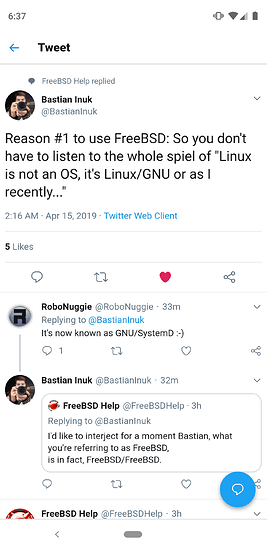fuck it. LETS DO IT LIVE!
Actually… let’s wait. I already caused a storm today. 
If you’re gonna do it do it live on stage, or don’t do it at all.
 goddamn gnu
goddamn gnu
How all of us feel like when we are working on our BSD Projects with the other OS running and terminals open and shit
My take on the BSD derivatives i use…
- FreeBSD: general minimalist server. e.g., BIND nameserver, smtp relay, etc. being “not linux” you can feel somewhat less worried about the latest mass-distributed linux 0-day affecting you. its a bit less of a target for skript-kiddies.
- FreeNAS: zfs file server, home user box to run multiple jails, VMs if you throw enough hardware at it. Also good as a poor-man’s NAS/SAN for a vSphere lab environment. i also use an instance as an “always on” tftp server for centralised storage (and scheduled backup) of CISCO configs
- pfsense: dedicated firewall box. ideal as VM lab environment or cheap high-throughput firewall on real hardware. Or cheap way to do inter-vlan routing if you don’t have a layer 3 switch handy.
Linux doesn’t get viruses because it’s more obscure than windows
So I’ll be more obscure than linux

Like it or not, it is a factor. 
I’m not saying write portable scripts but…

A new Section for something nerdy is always welcome!
I never used BSD, but now I am very curious. I don’t agree with their licensing, but at least it’s open-source.
What are the main differences between Linux and BSD I should be aware?
Apart that BSDs are kernel + userland in one package.
Not as user friendly.
Limited software (not really, but yeah).
Limited compatibility.
Better networking and file system out of the box (subjective)
I’d disagree with that, but like the trip from Windows to Linux, if you’re familiar with Linux you need to un-learn what you have learned and not assume it is the same.
FreeBSD for example is very logically thought out and once you click and “get it”, its very user friendly. More so than Linux in some respects because they
- give a fuck about maintaining APIs, ABI compatibility and documentation
- re-use standard tools to do the job where appropriate (e.g., make used in so many places for generating configs, software builds, etc.)
- the base OS is well defined, is much simpler (and thus easier to understand whats going on); combine with binary interface compatibility between versions and you can maintain ports and third party software seperately from base.
But if you go in there (as a Linux user, with no exposure to other *NIX) assuming “this is unix, i know this!” then you’re going to be fucked. Because Linux has diverged a very long way from UNIX. Linux is very much NOT unix in a lot of ways, and if your only exposure to a Unix-alike is Linux then you’re in for a lot of surprises.
If you’ve used say, Solaris, macos (command line), SCO, or AIX before you may be somewhat less surprised.
I’d definitely recommend (again) that every Linux user gets at least some exposure to one or more of the BSDs because even if you don’t use BSD for much, you will at least be exposed to some of the differences to expect if you ever need to figure out what is going on, on some other unix variant. Because the “Linux-isms” won’t be there.
A lot of the GNU toolchain for example is “different for no good reason”, hence the adage “different from GNU is not a bug”.
So just more obscure that Linux? 
My first real exposure to BSD on a personal system was taking Debian GNU/kfreebsd for a spin. It is Debian (my main OS) but with a BSD kernel. Once I tried that, I then took OpenBSD, FreeBSD, and PCBSD for a spin. FreeBSD kicked my ass during the installation process and on the 3rd or 4th try, finally got it right. PCBSD and OpenBSD did not give me much trouble.
Because a am permanent GNU/Linux user, I settled on DragonflyBSD because it is pragmatic and gets stuff done. It is basically BSD for most things, GNU/Linux when there is no better alternative in the BSD world, and some custom stuff when no good solution can be found. I recommend dragonfly as a bleeding edge BSD if you do not want to jump through hoops…
I gotta say OpenBSD is so easy to install lol. And basic configuring is also easy coz, unlike on even minimalistic base install like Arch there’s tons of shit, while on OpenBSD there’s almost nothing there. lol
the auto installer is fabolous and easy and as you say its very basic. 300+ mb iso average.
good stuff.
I installed OpenBSD on my mac and after booting all I get in my framebuffer is garbage…


